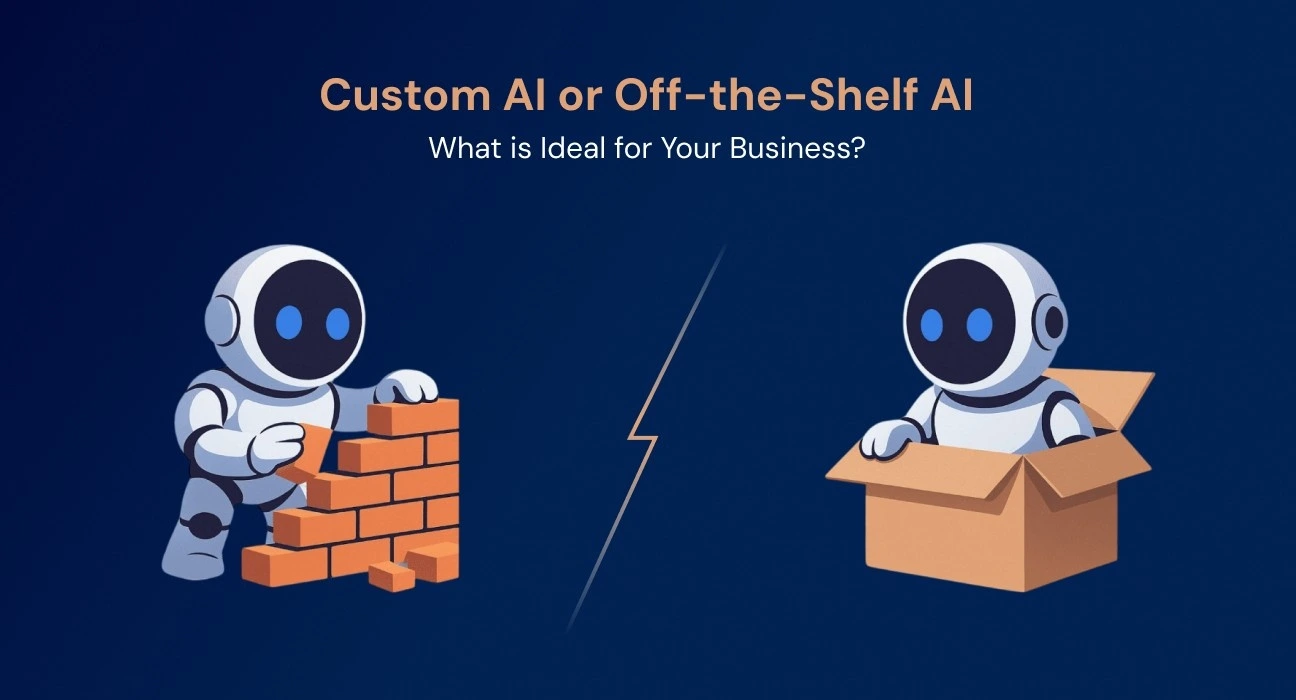

Key Takeaways
- It is important that you don’t let the ‘AI hype’ drive your decisions
- As per the recent reports, ready-made AI wins on speed, cost, and simplicity.
- When it comes to Custom AI, it triumphs on compliance, scale, and differentiation.
- Custom AI software development may feel expensive, but predictable ownership, compliance, and performance may outweigh everything else.
- Having a professional AI development services partner like LL Technolab can help you mix both models to gain quick wins.
Introduction
AI is no longer a trend, but the force behind the world’s best companies. The question is not, “Will you use AI, ” it is, “Which one do you want for your business, custom AI, or an off-the-shelf software solution?”
The choice you make matters a lot as it leads to cost-efficiency, scalability, and ultimately your long-term return on investment.
So, here we are going to discuss the custom AI development company solutions vs. readymade software development approaches in detail. We will address all the aspects related to these approaches right from industry statistics, detailed comparisons, to costs and help you proceed ahead with complete clarity.
AI Adoption: Current Landscape & Key Statistics
The global adoption of AI is skyrocketing. By 2025:
- 39% of SMEs will use AI (up from 26% in 2024), with 26% specifically using generative AI in operational processes.
- According to a Cloudera survey of 1,500 IT leaders, 96% are looking to deploy AI Agents by 2027, which speaks to collective confidence in the value of transformation.
- Most of the businesses using AI say they realized operational cost reductions of at least 1% and therefore higher operational efficiency.
However, when looking at the data:
- Only 8% of businesses have achieved advanced digital integration of AI, which highlights the complexity of strategically deploying AI effectively.
- For many, vanilla AI presents attractive off-the-shelf near-term promises of rapid ROI only to realize their limitations as their ambitions, security needs, and data complexity begin to emerge.
What is Off-the-Shelf AI? Benefits, Drawbacks & Use Cases
Off-the-shelf AI is defined as a solution that is ready to plug and play, that it comes with no customization and with pre-packaged solutions to solve a general or common business problem, such as chatbots, fraud detection modules, or analytics dashboards. Off the shelf AI is often delivered via the cloud, pre-configured and ready for the scaled use based on the size of the business.
Advantages
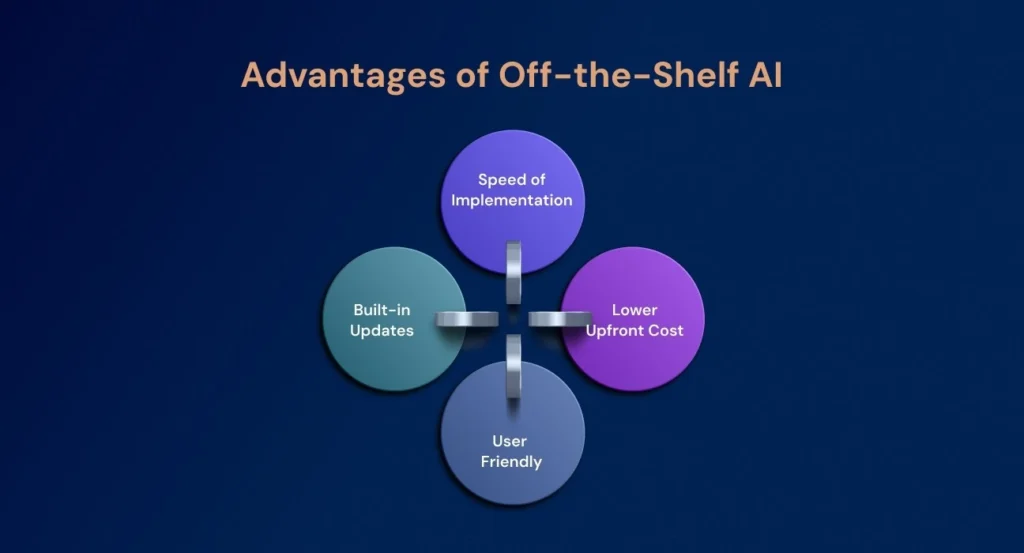
- Speed of Implementation: Off-the-shelf AI can be live in days or weeks, which can be an invaluable opportunity for startups and pilot programs where speed to results is paramount.
- Lower Upfront Cost: Off-guide, off-the-shelf solutions are typically priced on a per month budget, with a monthly investment of $2,000 to $5,000 for entry level, up to mid-tier service levels is the typical cost.
- User Friendly: Off-the-shelf solutions often take little, if any in-house subject matter expertise, with most requiring no more than signing up and integrating to other SaaS based applications.
- Built in Updates: The vendor covers maintenance, patches, and scaling risks.
Limitations
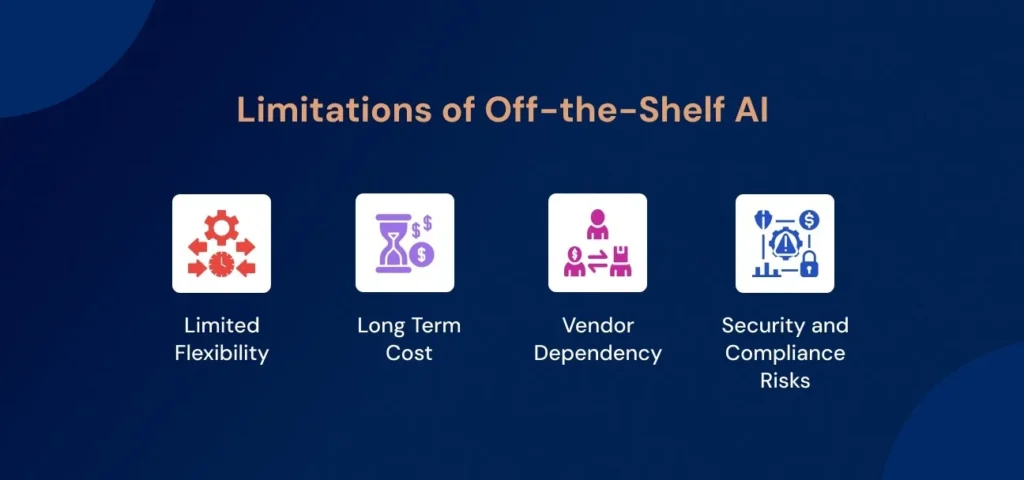
- Limited Flexibility: Off-the-shelf solutions aren’t made for any workflows that are complex or unique so a business will have to change their processes to use the functions in the tool.
- Vendor Dependency: If your business processes and data rely on the vendor and the product/service, the process to migrate will be costly and time consuming.
- Security and Compliance Risks: Data usually must stay on the vendor servers, and if in a sensitive industry (e.g., finance, healthcare) regulations and security will be complicated.
- Long Term Cost: The initial cost is often not much more than a typical vendor, but recurring licensing can add up quickly. Many companies can spend $70K – $200K or more in 36 months without owning the AI asset.
Common Use Cases
- Retail chatbots, simple analytics
- Automated appointment scheduling, in healthcare clinics
- Initial fraud detection modules, in banks
- Basic routing for support tickets, for small to medium businesses
Stat: Shopify indicated most merchants already use an AI chatbot to help save dozens of hours of staff time every month in engagement.
What Are Custom AI Solutions? Unmatched Power & Flexibility
Custom AI denotes completely customized AI entities and applications specifically constructed and engineered around an organization’s unique data, organizational rules, user base, and compliance criteria. Custom AI development services is delivered by a Company, and it can often be transformational, providing unique value and real competitive advantage.
Advantages
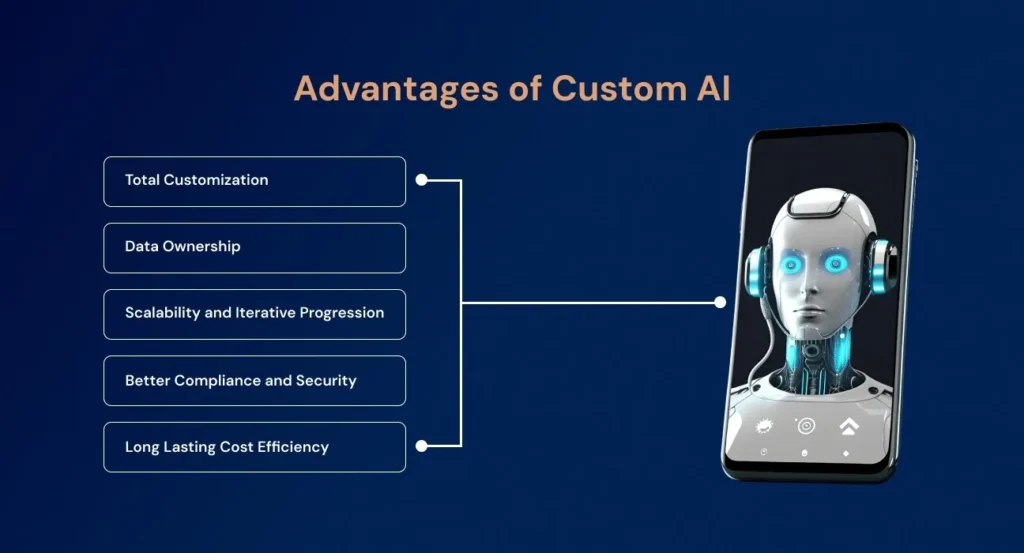
- Total Customization: Customized for your precise workflows, processes, and data, including company-specific logic. For example, diagnostics in healthcare or custom risk modelling in financial services.
- Data Ownership: Your business has complete control over where data resides and how it is used, this is critical in regulated industries.
- Scalability and Iterative Progression: In owning the proprietary code and AI algorithms, you are allowed to tune for infinitely as you change your needs, and thus this solution evolves with your business model.
- Better Compliance and Security: Pathways within the solution for audit trails, encryption, role-based access and sector-specific standards (for example, GDPR, or HIPAA) is exponentially easier in the beginning.
- Long Lasting Cost Efficiency: The upfront investment is high, but the licensing fees don’t compound, and the IP is also a strong asset on the balance sheet.
Limitations
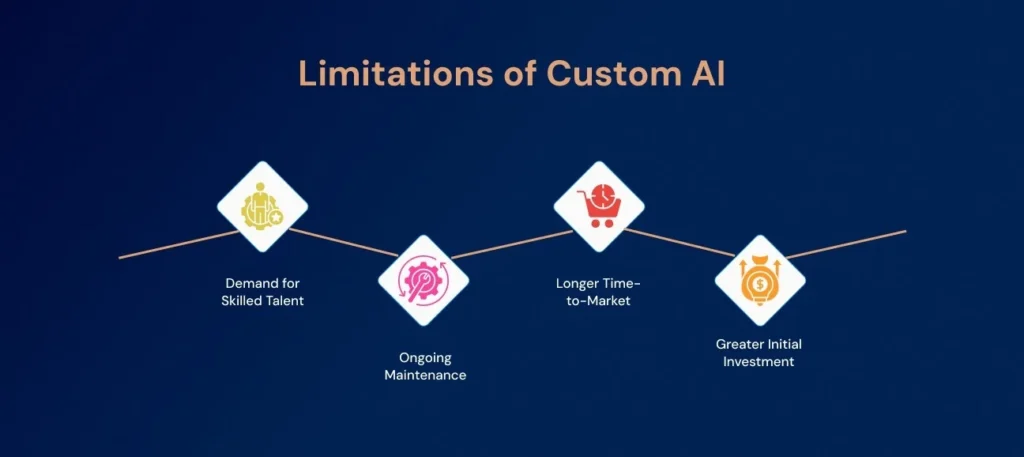
- Greater Initial Investment: A custom AI application generally requires about $100,000 to $1,50,000+ for initial development, but your organization owns the intellectual property (IP).
- Longer Time-to-Market: Development timeframes will generally last several months, not weeks.
- Ongoing Maintenance: Your internal team/partner (if outsourced) will be required to maintain and update the system.
- Demand for Skilled Talent: The success of custom systems often depends on talented, technical AI development services (inside your organization or from an outside vendor).
Example Use Cases
- Mayo Clinic’s proprietary cardiac diagnostic model that achieved best-in-industry accuracy,
- JP Morgan’s COIN platform that processes thousands of contracts in seconds and saves more than 360,000 hours of legal labor each year,
- Multinational retailers are building individual recommendation engines that go beyond generic recommendation systems.
Also Read: Low-Code & No-Code AI: Democratizing Automation in Enterprises
Off-the-Shelf vs Custom AI: Detailed Comparison
The table below succinctly features essential differences for decision-makers seeking clarity:
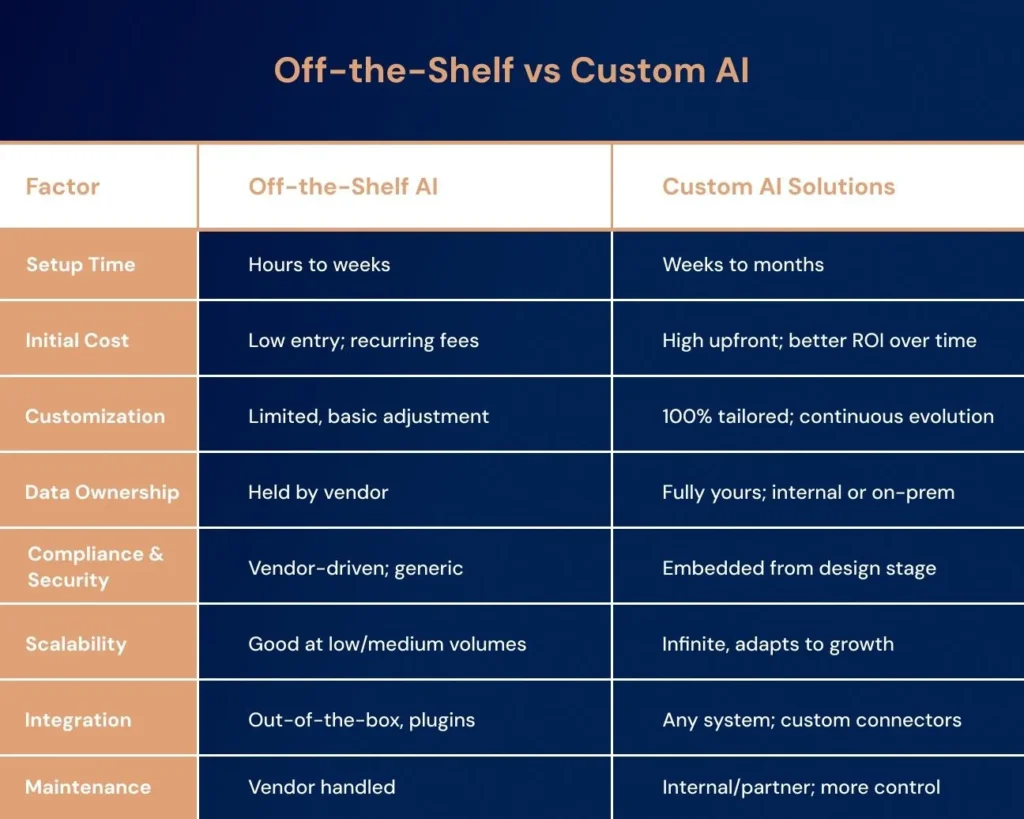
The Cost of Custom AI Software Development
- Having the ability to budget for AI is not only a technical consideration but a strategic consideration that will affect the rest of the business:
- Basic AI projects: $10,000 – $25,000
- Complex custom model or agent: $100,000 – $1,80,000+.
- Annual fee for 3rd party AI software: $30,000+.
- Average college-educated AI development team hourly rate: $27 – $50/hour; consulting rates: $170 – $400/hour.
It’s important to consider that maintenance for custom software solutions usually costs 15 – 20% of total build cost, but maintenance is important for you to have complete oversight and alignment with your business.
Off-the-Shelf vs Custom AI: Reacting To Industries
Each industry has its own pivot point, balancing “off-the-shelf vs custom AI”:
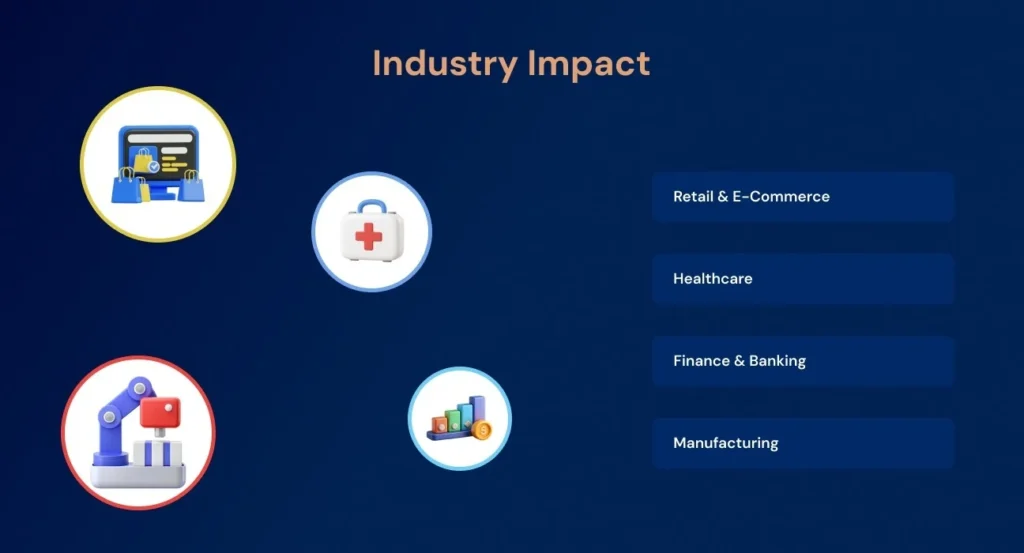
1. Retail & E-Commerce
For e-commerce and retail, “out-of-the-box” AI is great for quickly deploying chatbots and simple recommendations for businesses that need automation instantly. Custom AI provides a deeper level of insight to aid in advanced personalization, forecasting, and inventory optimization. Brands that employ custom AI have a competitive advantage.
2. Healthcare
In healthcare, using off-the-shelf AI can be useful for automating patient appointments or other basic administration tasks, again improving efficiencies with minimal investment. However, only custom AI can drive the improved accuracy, security, and data integration that is required for critical operations such as diagnostics and treatment recommendations.
3. Finance & Banking
In finance and banking, off-the-shelf AI can provide companies low-cost solutions for basic fraud detection or small-scale scoring where time will remedy the basic need. With more complex analytics for risk, large-scale anti-fraud, or compliance management, custom AI can be employed as it serves to meet complex financial regulations.
4. Manufacturing
Manufacturers benefit from off-the-shelf AI for predictive maintenance pilots and optimizing limited workflows. In contrast, Custom AI solutions provide complete support for organizations and will fit within the complexity of the manufacturing environment and dynamic operational needs.
Final Thoughts
So, this shows how choosing between pre-built software AI versus custom AI needs to be done? Make sure you do not base your decision strictly on practicality These choices should not just be about short-term practicality, they should be about how AI deployment services and software investments fit into your overall longitudinal business strategy, risk, and competitiveness. This is where you can always take assistance from experienced custom software development company, LL Techonlab as you get experts to help you determine the specifics of these options, and turn your AI experience into value making and successful investments.
FAQs
Q: What’s the difference between pre-built AI software and custom AI?
Answer: The difference is that pre-built AI software is ready-made and easy to implement, but it has very little flexibility and higher long-term cost at scale. Custom AI is custom-built, secure, and owned by the application owner.
Q: Which industries are in the most need of custom AI solutions?
Answer: Industries that are highly regulated and complex, including healthcare, finance, and mass retail.
Q: What is the actual cost of custom AI software development?
Answer: A solid custom solution generally starts at $100K-$200K, plus the annual maintenance phase of 15-20% of the build cost.
